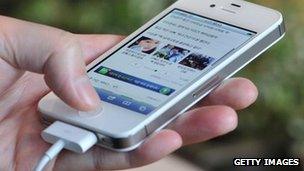Nokia and Apple squabbles delay Sim card ruling
- Published

The new smaller Sim is essential for the next generation of smartphones, manufacturers say
A decision regarding the next format for mobile Sim cards has been delayed after negotiations over patents ground to a halt, French media has reported.
Apple and Nokia, along with other manufacturers, are locked in dispute over proposals for a new "nano-Sim".
Nokia has threatened to withhold crucial patents if Apple's proposal is adopted, arguing that it does not comply with required specifications.
The ruling has been postponed until the end of June.
All firms want to secure the new format to keep up with devices which are getting ever smaller and slimmer.
The nano-Sim will be at least a third smaller than the micro-Sim commonly found in today's smartphones.
The European Telecommunications Standards Institute (Etsi) is the body responsible for setting the global standard for the format.
By polling its membership - which consists of telecoms providers and manufacturers - it aims to reach a consensus over the ideal standards for future technologies.
However, views over which nano-Sim should be adopted have divided the industry, resulting in the vote postponement,Les Echos reports, external.
'Offering a bicycle'
In one corner, Apple has proposed its own card which it said it will offer on a royalty-free basis to other manufacturers.
In the other, Nokia offers a different card which it said is 23% smaller and is they say more in line with Etsi's specific requirements.
Nokia's stance is backed by Motorola Mobility - which is being taken over by Google - and Blackberry-maker Research In Motion (RIM).
RIM has alsoaccused Apple of attempting to vote "by proxy", external, registering its own employees as representatives for other firms.
A Nokia source told the BBC that Apple's offer of allowing royalty-free use of its Sim-related patents was "like offering a bicycle in order to borrow our Mercedes".
Withheld patents
Prior to negotiations, Etsi said the nano-Sim must meet key criteria.
These include a stipulation that the new card must not be likely to be confused with existing Sim cards to avoid consumers mistakenly damaging their phones by inserting the wrong type of card.
Nokia argue that Apple's proposed card is the same length as the current width of the micro-Sim, and therefore fails this requirement.
If Apple's proposal is voted through, Nokia said it will withhold more than 50 patent families it believes are crucial to its implementation.
"We are not prepared to get into a position where our technology is used to implement a standard that is technologically inferior, and doesn't meet Etsi's own requirements," Mark Durrant, Nokia's director of communications, told the BBC.
Apple declined to comment on Friday's delay.
In the past, Apple has hinted at wanting to abolish Sim cards altogether. However, this was met with firm resistance by mobile network operators and retailers.
- Published29 March 2012
- Published27 March 2012